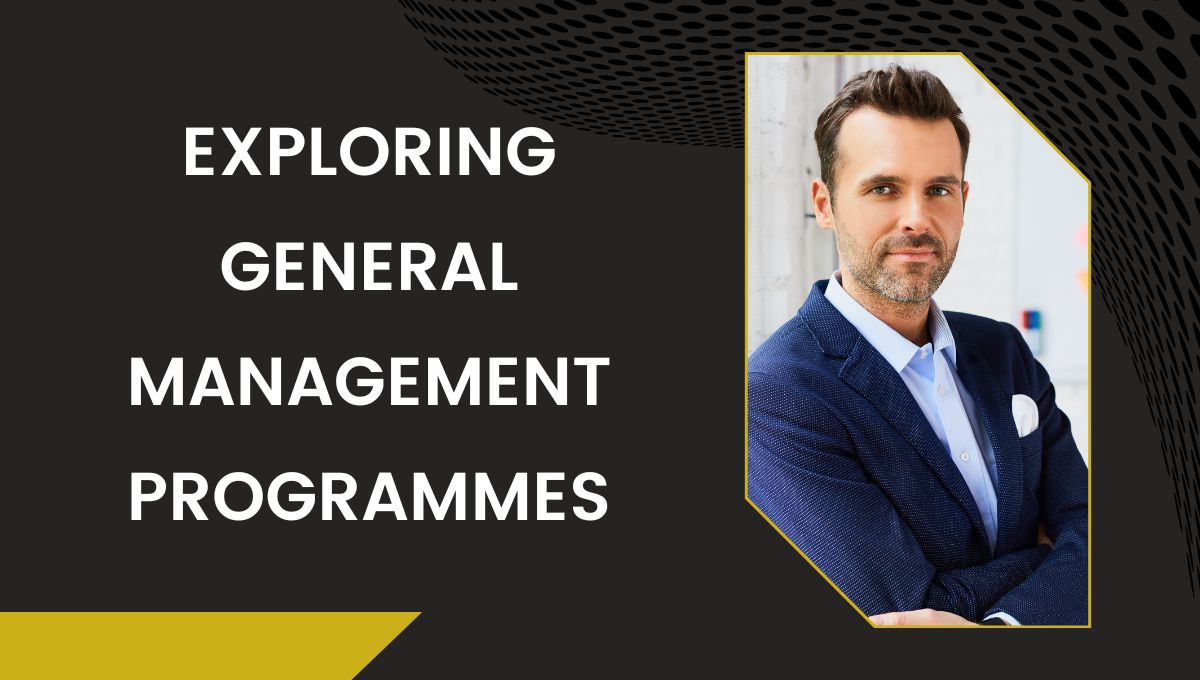Table of Contents
- Introduction
- Understanding a General Management Programme
- Leadership Development Training: Why It’s Critical for Executives
- Executive Management Skills: How a General Management Programme Benefits
- General Management Certification: A Career Stepping Stone
- Strategic Decision-Making: The Heart of Business Leadership
- Business Leadership Program: Essential Elements for Success
- Corporate Leadership Training: Building Future-Ready Leaders
- Management Skills for Executives: Closing the Gap Between Strategy and Execution
- Advantages of a General Management Programme (Table)
- Conclusion
Introduction
Think about being at the head of an organisation and making choices about its future and facilitating teams to achieve success and promote innovation. Leadership is not solely about managing people; it is about vision, strategy, and flexibility. Nevertheless, great leaders are not born; great leaders are made. This is where a General Management Programme becomes essential. Whether you’re an experienced executive enhancing your executive management capabilities or an emerging leader preparing for a larger role – joining a business leadership programme can be a big step towards professional development! In a competitive marketplace & an increasingly dynamic business landscape, professionals need formal education in effective decision making. We will reflect on the ways in which this program can help you harness your leadership power, develop your decision-making skills, and enhance career advancement strategies to help you with decision-making speed and effectiveness.
Understanding a General Management Programme
A General Management Programme (GMP) is an executive-level, intensive learning opportunity to build upon and increase management skills for executives. GMP includes foundational leadership principles, strategic decision-making, and business operations to aid professionals in addressing ambiguous and challenging business situations confidently. GMP is designed to narrow the chasm between information learnt through classic leadership practices and the requirements of a modern business environment. The GMP offered experiential learning, a global perspective, and exposure to industry insights. Participants gain valuable management knowledge through content-based presentations by business experts, and opportunities to engage in the learning environment with their peers.
Who is it for?
- Mid-to-senior level managers seeking to make a transition into leadership roles.
- Entrepreneurs looking to sharpen their strategic vision & operate more efficiently.
- Managers looking to build a complete understanding of business functions so they can make better business decisions.
- Professionals wanting to build an expansive knowledge of international business & a solid network.
Leadership Development Training: Why It’s Critical for Executives
In the fast-paced business world of today, leadership is not merely a designation—it’s a duty. Leadership development training provides professionals with:
- The skills to motivate and lead teams effectively through communication, motivation, and vision.
- Strengthened problem-solving & conflict-resolution abilities to effectively address organisational difficulties.
- A richer insight into organisational behaviour & culture that leads to more effective change management and business advancement.
- Heightened self-awareness & emotional intelligence that allows leaders to address stress, nurture teamwork and establish a high-performing workplace culture.
- The chance to develop critical mentoring and coaching skills to support the development of emerging leaders within the organisation.
Executive Management Skills: Why a General Management Programme Makes a Difference
A General Management Programme enhances executive management skills by:
- Offering practical business case studies to study challenging business issues and determine solutions.
- Fostering strategic thinking and creative problem-solving – enabling executives to make sound decisions under pressure.
- Developing communication & negotiation skill sets, which are appropriate for good leadership and stakeholder management.
- Providing financial literacy, allowing professionals to – read financial statements, budgets, or plans for investment.
- Giving access to data-based decision-making so leaders can utilise analytics & insights from data to enable business performance improvement.
General Management Certification: A Stepping Stone to Career Growth
Obtaining a general management certification proves your dedication to ongoing learning. It:
- Verifies your business and leadership knowledge, indicating your capability to manage intricate management positions successfully.
- Increases your career and income opportunities by making you a highly skilled executive in the workplace.
- Grants exposure to a solid professional network, providing chances to get in touch with industry leaders and influential mentors.
- Gains credibility in your organisation, putting you at the top of lists for promotions and leadership roles.
- Enables you to remain one step ahead of changing business trends, with skills that remain contemporary and responsive to shifting market trends.
Strategic Decision-Making: The Key to Business Leadership
Strategic decision-making is perhaps the most important part of leadership. A General Management Programme imparts:
- Data-driven decision-making skills enabling leaders to examine business scenarios in an objective and logical manner and create effective strategies.
- Risk assessment and mitigation plans to equip businesses with market fluctuations, competition, and unexpected challenges.
- Scenario planning for uncertain business landscapes, allowing leaders to create forward-looking instead of reactive strategies.
- The skill to reconcile short-term objectives with long-term business sustainability, ensuring sustained success and profitability.
- Methods to create innovation and promote creative problem-solving among teams, resulting in breakthrough business strategies.
Business Leadership Program: Key Elements for Success
A world-class business leadership programme emphasises:
- Financial and operational management, allowing executives to maximise resources and fuel business growth.
- Global business trends and market dynamics, enabling leaders to remain ahead in a more connected world.
- Leadership ethics and corporate governance, emphasising the value of responsible leadership and decision-making.
- Change management strategies that prepare executives to lead organisations through change effectively.
- Hands-on experiential learning, such as simulations and real-world projects, that equip professionals for actual business challenges.
Corporate Leadership Training: Developing Future-Ready Leaders
Corporate leadership training equips professionals for high-stakes positions by:
- Developing crisis management competencies, so leaders are equipped to respond well to organisational disruption and crisis.
- Building emotional intelligence in order to build a healthy work culture and enhance team dynamics.
- Developing an innovation culture, inspiring organisations to adopt change and transition to new business models.
- Instituting cross-functional collaboration, so leaders may work fluidly across functions and business units.
- Enabling leaders to develop a vision orientation, hence being able to drive long-term business success and sustainability.
Management Skills for Executives: Closing the Strategy-Execution Gap
Grooming executives’ management skills guarantees:
- Delegation and utilisation of resources to be done effectively, enabling the leaders to drive maximum team output and performance.
- Improved collaboration and performance at the team level due to enhanced leadership and interpersonal relationship skills.
- Effective manoeuvring of change in the organisation to ensure transition during business expansions, mergers, or restructurings.
- Better customer-focused strategies that allow businesses to better manage customer experiences and company reputation.
- An outcome-based approach to leadership that aligns corporate goals with performance measures.
Advantages of a General Management Programme
| Benefit | Description |
| Career Growth | Provides opportunities for senior leadership roles. |
| Strategic Thinking | Enables leaders to make decisions through frameworks. |
| Networking Opportunities | Connects you with industry experts. |
| Hands-on Learning | Provides real-world case studies and simulations. |
| Global Perspective | Entails international business trends. |
Key Takeaways
- A General Management Programme is a potent tool for leadership development.
- It develops executive management skills and strategic decision-making.
- General management certification improves career opportunities.
- Practice-based learning using real-world case studies is given importance through programmes.
FAQs
1. How long is a General Management Programme?
A majority of the programmes take from a few weeks to several months, depending on the course format and institution.
2. Who is the General Management Programme designed for?
Professionals at a mid-senior level, entrepreneurs, and managers who want to develop their leadership and strategic decision-making capabilities.
3. How does leadership development training support executive professionals?
A leadership development programme will help build important leadership capabilities that include team management, decision-making, and problem-solving capabilities.
4. What are the advantages of general management certification?
Provides credible validation of expertise, improves professional opportunities, and establishes networks of professional networks.
5. How does corporate leadership training prepare professionals for top roles?
It improves crisis management, emotional intelligence, and strategic planning capabilities.
6. Does strategic decision-making form a central part of a General Management Programme?
Yes, it offers blueprints for making value-driven, high-impact business decisions.
7. Does a business leadership programme enhance financial management skills?
Yes! Such programmes typically feature financial strategy, budgeting, and risk management.
8. Which industries are most benefitted by management skills for executives?
Finance, technology, healthcare, and consulting industries benefit the most.
9. Are online General Management Programmes as effective as classroom programmes?
Yes, they are!
Most online courses provide flexibility, interactive learning, and relevant industry content.
10. How do I select the appropriate General Management Programme?
Look at accreditation, faculty qualifications, relevance of curriculum, and industry endorsement.
Conclusion
Leadership is an acquired competency that requires ongoing discipline and flexibility. A general management program provides the tools, knowledge, and network required to perform well in executive leadership. If you are hoping to refine your style of leadership, elevate your strategic thought, or elevate your career to its upper echelon, taking an active engagement with business leadership is most likely the best way to go about it. Engaging in structured executive education supports professional competency building that provides readiness, the accumulation of actionable knowledge and the application of that knowledge for success in today’s complex world of business.





